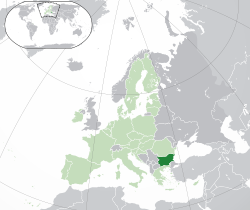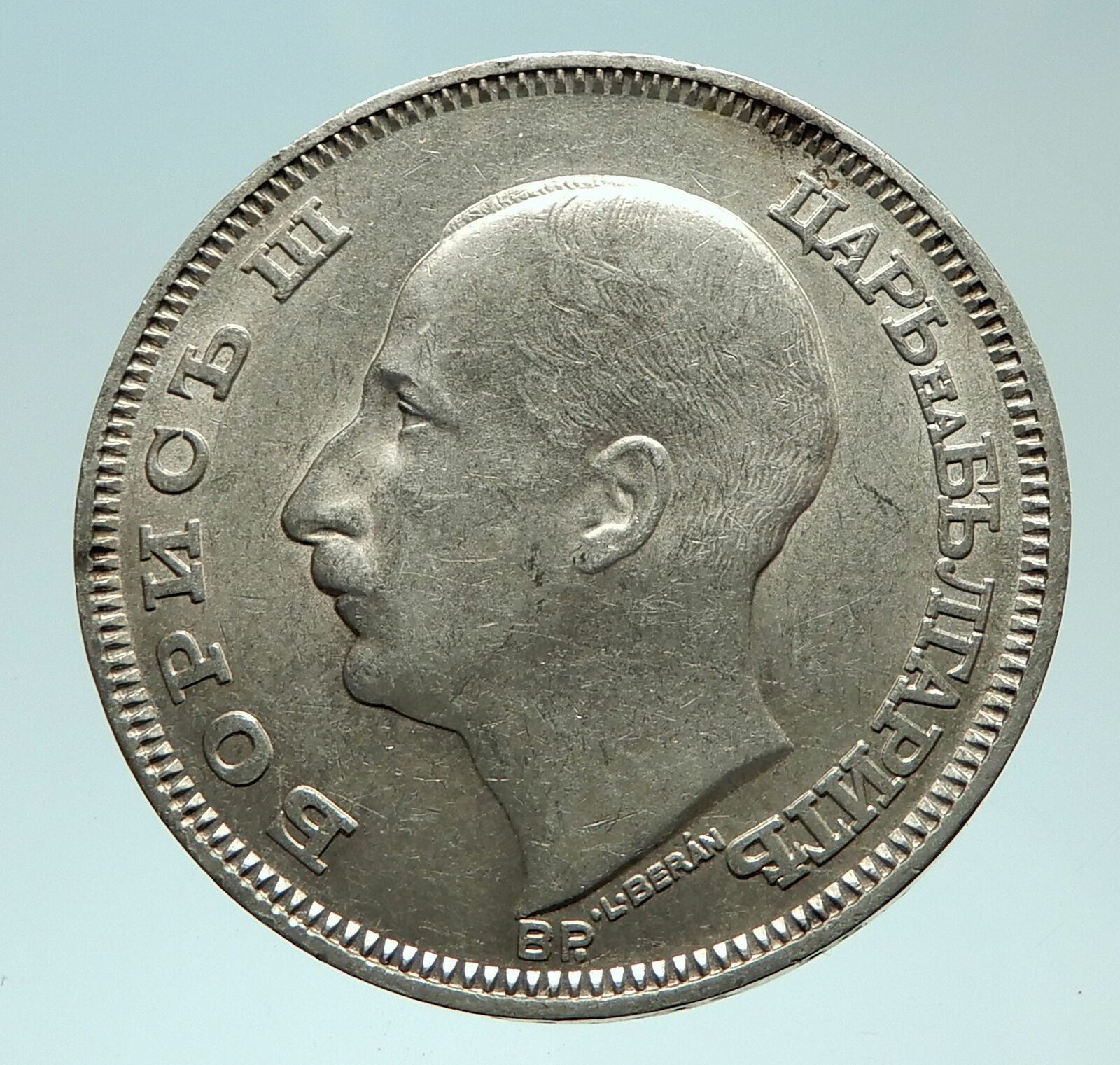|
Bulgaria
150th Anniversary – Birth of Georgi S. Rakovski
1971
Proof Silver 5 Leva 36mm (20.50 grams) 0.900 Silver (0.5932 oz. ASW)
Reference: KM# 79
НАРОДНА РЕПУБЛИКА БЪЛГАРИЯ 1971 * 5 ЛЕВА *, Coat-of-arms of People’s
Republic of Bulgaria.
ГЕОРГИ С. РАКОВСКИ * 1821 – 1867 *, Portrait of Georgi S. Rakovski.
Edge Design:
Stars evenly interspersed around edge.
You are bidding on the exact item pictured, provided with a Certificate of Authenticity and Lifetime Guarantee of Authenticity.
 Georgi Stoykov Rakovski (Bulgarian: Георги Стойков Раковски) (1821 – 9 October 1867), known also Georgi Sava Rakovski (Георги Сава Раковски), born Sabi Stoykov Popovich (Съби Стойков Попович), was a 19th-century Bulgarian revolutionary, freemason, writer and an important figure of the Bulgarian National Revival and resistance against Ottoman rule. Georgi Stoykov Rakovski (Bulgarian: Георги Стойков Раковски) (1821 – 9 October 1867), known also Georgi Sava Rakovski (Георги Сава Раковски), born Sabi Stoykov Popovich (Съби Стойков Попович), was a 19th-century Bulgarian revolutionary, freemason, writer and an important figure of the Bulgarian National Revival and resistance against Ottoman rule.
1861 saw him organizing a Bulgarian legion in Belgrade, where he met voivode Đuro Matanović to negotiate a simultaneous rebellion in Bulgaria, Bosnia-Herzegovina, and Albania, and travelling through Europe recruiting support for his country’s cause. While his radical views often met opposition from more moderate minds, his writings incited youth to go against the Turks. It was in this year that he wrote his Plan for the Liberation of Bulgaria. Many young people rallied under his flag to fight the Ottomans alongside the Serbs. However the conflict between Serbia and the Ottoman Empire was soon resolved and the legion was dissolved. During raids and recruiting G.S Rakovski stayed hidden at many addresses throughout the southern regions of Bulgaria. Rakovski moved to Bucharest, where he continued his journalistic and revolutionary activities.
Once there, he published a bilingual newspaper, Badushtnost. Rakovski was a supporter of Romania’s reformist policies, and seeing potential, he began to support a union between Bulgaria and Romania. In Badushtnost, he appealed to good Bulgarian-Romanian relations and made reference to the Second Bulgarian Empire, in which both Bulgarians and Romanians lived together.
Led by the belief that Ottoman power could be brought down only with armed action, he began organizing small groups of revolutionary fighters, called cheti. Their aim was to instigate unrest in Bulgaria, thus motivating the population to fight the Ottomans. For the purpose of coordinating the armed resistance Rakovski and his followers founded the Bulgarian Revolutionary Central Committee – an organization which was yet to feature in the Bulgarian Liberation movement.
In 1867 the Committee equipped two bands (cheti) who penetrated Bulgaria led by Panayot Hitov and Filip Totyu. They fought battles with the Ottoman forces, but did not manage to fulfill their goals. Led by Hadzhi Dimitar and Stefan Karadzha, 120 chetnitsi entered Bulgaria in 1868 and fought their way to Stara Planina before being surrounded by the Ottomans. Some of the fighters, including Stefan Karadzha, were wounded, captured and later executed. The remaining men under the leadership of Hadzhi Dimitar were crushed at Buzludzha Peak in Stara Planina.
Georgi Rakovski died of tuberculosis in Bucharest on October 9, 1867.

Bulgaria (Bulgarian: България, tr. Bǎlgariya), officially the Republic of Bulgaria (Bulgarian: Република България, tr. Republika Bǎlgariya, IPA: [rɛˈpublikɐ bɐɫˈɡarijɐ]), is a country in southeastern Europe. It is bordered by Romania to the north, Serbia and Macedonia to the west, Greece and Turkey to the south, and the Black Sea to the east. With a territory of 110,994 square kilometres (42,855 sq mi), Bulgaria is Europe’s 16th-largest country.
 Organised prehistoric cultures began developing on current Bulgarian lands during the Neolithic period. Its ancient history saw the presence of the Thracians, Ancient Greeks, Persians, Celts, Romans, Goths, Alans and Huns. The emergence of a unified Bulgarian state dates back to the establishment of the First Bulgarian Empire in 681 AD, which dominated most of the Balkans and functioned as a cultural hub for Slavs during the Middle Ages. With the downfall of the Second Bulgarian Empire in 1396, its territories came under Ottoman rule for nearly five centuries. The Russo-Turkish War of 1877-78 led to the formation of the Third Bulgarian State. The following years saw several conflicts with its neighbours, which prompted Bulgaria to align with Germany in both world wars. In 1946 it became a one-party socialist state as part of the Soviet-led Eastern Bloc. In December 1989 the ruling Communist Party allowed multi-party elections, which subsequently led to Bulgaria’s transition into a democracy and a market-based economy. Organised prehistoric cultures began developing on current Bulgarian lands during the Neolithic period. Its ancient history saw the presence of the Thracians, Ancient Greeks, Persians, Celts, Romans, Goths, Alans and Huns. The emergence of a unified Bulgarian state dates back to the establishment of the First Bulgarian Empire in 681 AD, which dominated most of the Balkans and functioned as a cultural hub for Slavs during the Middle Ages. With the downfall of the Second Bulgarian Empire in 1396, its territories came under Ottoman rule for nearly five centuries. The Russo-Turkish War of 1877-78 led to the formation of the Third Bulgarian State. The following years saw several conflicts with its neighbours, which prompted Bulgaria to align with Germany in both world wars. In 1946 it became a one-party socialist state as part of the Soviet-led Eastern Bloc. In December 1989 the ruling Communist Party allowed multi-party elections, which subsequently led to Bulgaria’s transition into a democracy and a market-based economy.

Bulgaria’s population of 7.2 million people is predominantly urbanised and mainly concentrated in the administrative centres of its 28 provinces. Most commercial and cultural activities are centred on the capital and largest city, Sofia. The strongest sectors of the economy are heavy industry, power engineering, and agriculture, all of which rely on local natural resources.
The country’s current political structure dates to the adoption of a democratic constitution in 1991. Bulgaria is a unitary parliamentary republic with a high degree of political, administrative, and economic centralisation. It is a member of the European Union, NATO, and the Council of Europe; a founding state of the Organization for Security and Co-operation in Europe (OSCE); and has taken a seat at the UN Security Council three times.
|





 Georgi Stoykov Rakovski (Bulgarian: Георги Стойков Раковски) (1821 – 9 October 1867), known also Georgi Sava Rakovski (Георги Сава Раковски), born Sabi Stoykov Popovich (Съби Стойков Попович), was a 19th-century Bulgarian revolutionary, freemason, writer and an important figure of the Bulgarian National Revival and resistance against Ottoman rule.
Georgi Stoykov Rakovski (Bulgarian: Георги Стойков Раковски) (1821 – 9 October 1867), known also Georgi Sava Rakovski (Георги Сава Раковски), born Sabi Stoykov Popovich (Съби Стойков Попович), was a 19th-century Bulgarian revolutionary, freemason, writer and an important figure of the Bulgarian National Revival and resistance against Ottoman rule.
 Organised prehistoric cultures began developing on current Bulgarian lands during the Neolithic period. Its ancient history saw the presence of the Thracians, Ancient Greeks, Persians, Celts, Romans, Goths, Alans and Huns. The emergence of a unified Bulgarian state dates back to the establishment of the First Bulgarian Empire in 681 AD, which dominated most of the Balkans and functioned as a cultural hub for Slavs during the Middle Ages. With the downfall of the Second Bulgarian Empire in 1396, its territories came under Ottoman rule for nearly five centuries. The Russo-Turkish War of 1877-78 led to the formation of the Third Bulgarian State. The following years saw several conflicts with its neighbours, which prompted Bulgaria to align with Germany in both world wars. In 1946 it became a one-party socialist state as part of the Soviet-led Eastern Bloc. In December 1989 the ruling Communist Party allowed multi-party elections, which subsequently led to Bulgaria’s transition into a democracy and a market-based economy.
Organised prehistoric cultures began developing on current Bulgarian lands during the Neolithic period. Its ancient history saw the presence of the Thracians, Ancient Greeks, Persians, Celts, Romans, Goths, Alans and Huns. The emergence of a unified Bulgarian state dates back to the establishment of the First Bulgarian Empire in 681 AD, which dominated most of the Balkans and functioned as a cultural hub for Slavs during the Middle Ages. With the downfall of the Second Bulgarian Empire in 1396, its territories came under Ottoman rule for nearly five centuries. The Russo-Turkish War of 1877-78 led to the formation of the Third Bulgarian State. The following years saw several conflicts with its neighbours, which prompted Bulgaria to align with Germany in both world wars. In 1946 it became a one-party socialist state as part of the Soviet-led Eastern Bloc. In December 1989 the ruling Communist Party allowed multi-party elections, which subsequently led to Bulgaria’s transition into a democracy and a market-based economy.





